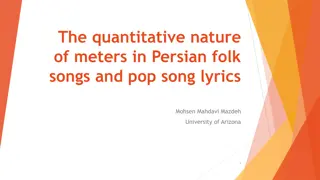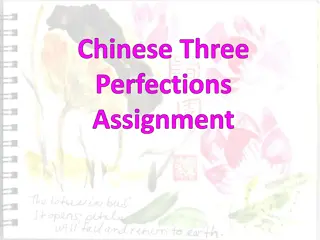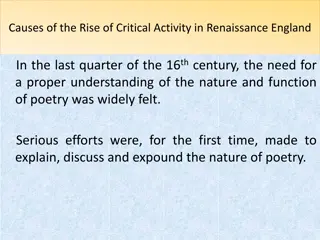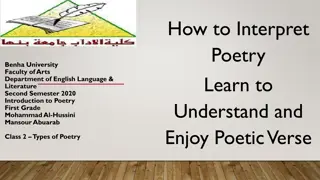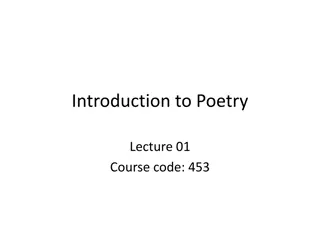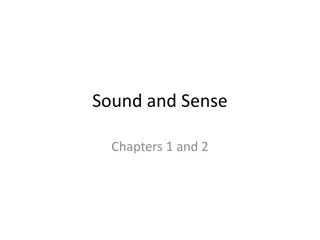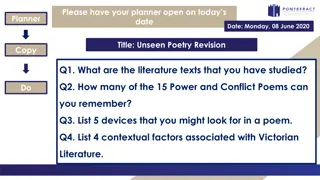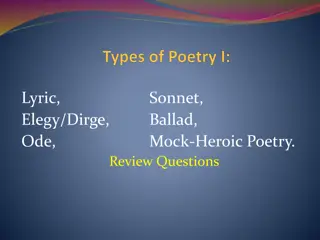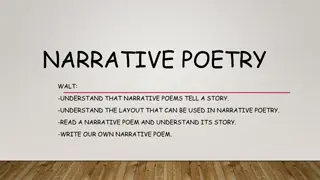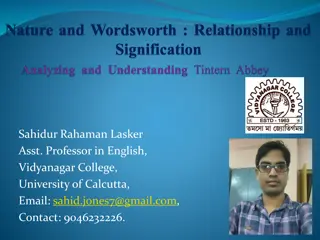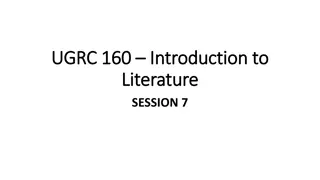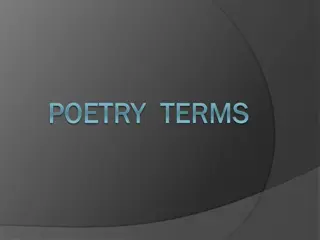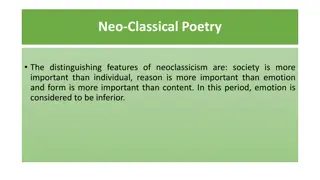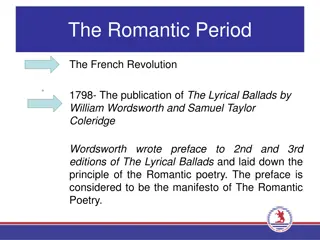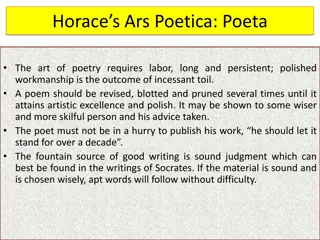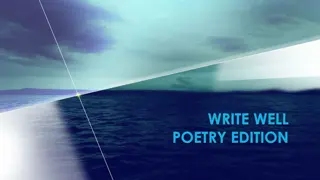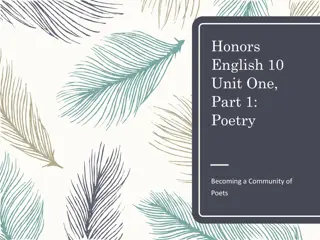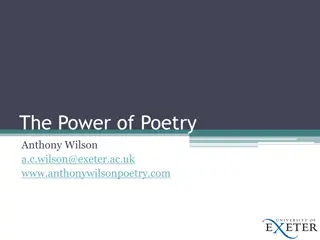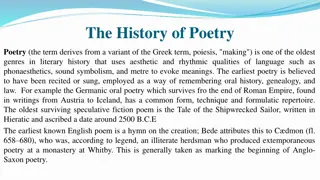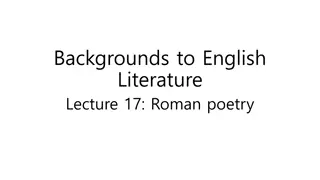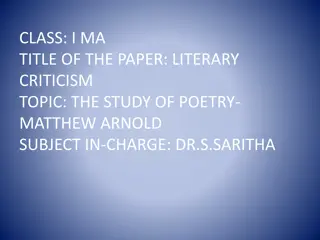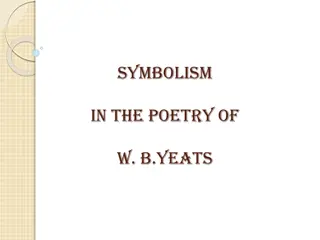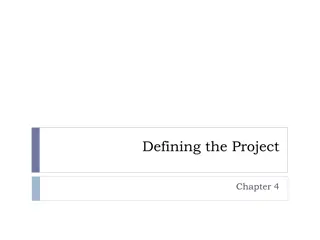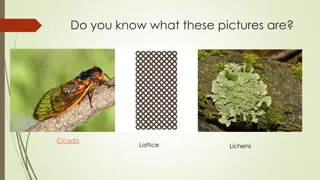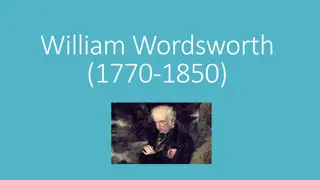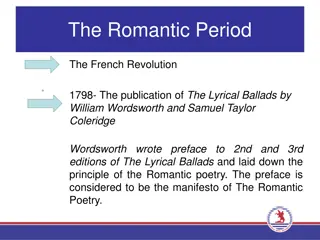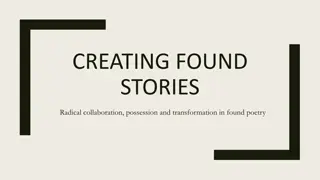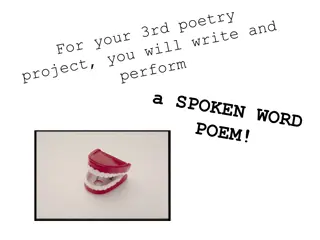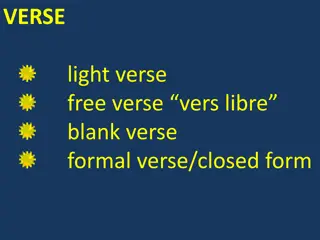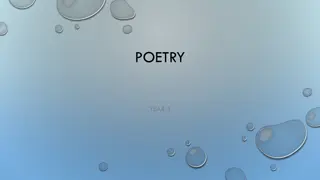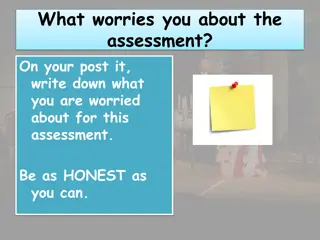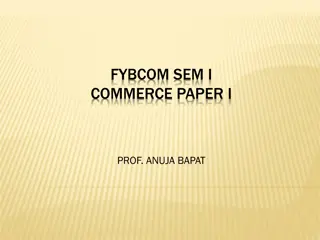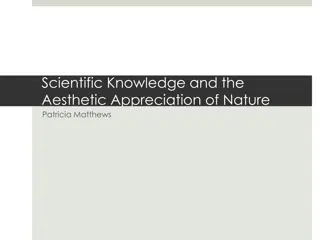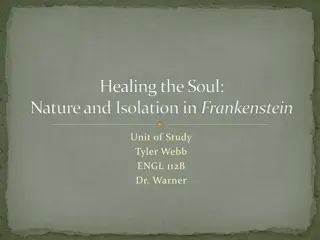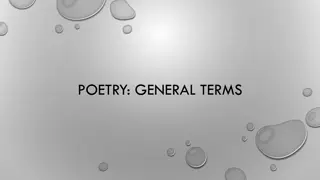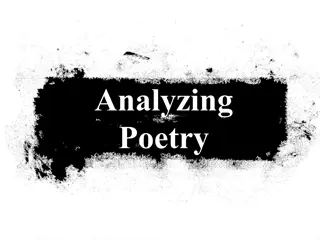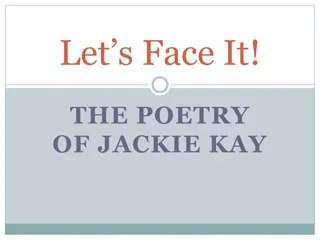Understanding Poetry: Nature, Scope, and Characteristics
Poetry encompasses the essence of life through its content and form, providing a medium to express subjective reactions to objective experiences. It delves into various aspects like philosophy, beliefs, traditions, history, and personal emotions, evoking different responses from laughter to tears. Through carefully crafted messages, poetry captures the complexity of human experiences and stimulates deep contemplation.
Download Presentation

Please find below an Image/Link to download the presentation.
The content on the website is provided AS IS for your information and personal use only. It may not be sold, licensed, or shared on other websites without obtaining consent from the author. Download presentation by click this link. If you encounter any issues during the download, it is possible that the publisher has removed the file from their server.
E N D
Presentation Transcript
Nature, Concept, Scope and Characteristics of Poetry Functions of Poetry Review Questions
Hurrah for Thunder by Christopher Okigbo WHATEVER happened to the elephant- Hurrah for thunder But already the hunters are talking about pumpkins: If they share the meat let them remember thunder. The elephant, tetrarch of the jungle: With a wave of the hand He could pull four trees to the ground His four mortar legs pounded the earth: The eye that looks down will surely see the nose; The finger that fits should be used to pick the nose. Wherever they treaded, The Grass was forbidden to be there. Today for tomorrow, today becomes yesterday: How many million promises can ever fill a basket... Alas! The elephant has fallen- Hurrah for thunder- If I don't learn to shut my mouth I'll soon go to hell, I, Okigbo, town-crier, together with my iron bell. (Christopher Okigbo from New Poetry from Africa)
Nature of Poetry What is Poetry? It is that something that has to be told (said) and a way, manner, method or medium of saying it. In effect poetry is made up of two parts: Poetry = Content (Message) + Form (Manner of Saying it)
Scope of Poetry Scope = Objective Experience(s)
Objective Experience Life and everything about life which might include: Various philosophies (capitalism, Communalism) Belief (Christianity, Islam, Buddhism, Hinduism) Environmental Influences (Harmattan, rain, winter) ) Custom (rites, initiations, confirmations) History (of individuals and people) Traditions Social/family upbringing Social Practices (birthdays, burials etc) Objects (spoon, table, trees,) Events (Holidays, school days, wars, ) People (You, friend, mother, president) Animals (Cat, dogs, snake, lizards) Occasions etc. (birthdays, Ofala) ) ) ) ) ) )Experiences and Reactions ) ) ) ) ) )
Different Reactions Different Responses: Learn more about the subject or people etc. Laughter Exercise caution Tears Think more about life Smiles
Content or the Message of Poetry Every good poem presents (not tell, inform) us with a complete experience of life in such a way that it excites our responses in numerous ways. Message = Objective Experience(s) => Subjective Reaction
Characteristics of Poetry Form (Way/Manner of saying it) Language Point of View Form
Characteristics of LANGUAGE Society =>Language and Language => Society Offer ways of defining our Society Describing our society Incorporates societal ideas/cultural norms/practices Conquering our society (by naming it)
Language contd. Structure of Language (system with rules that govern it) (Sound) (Letters and Words) (Sentences) (Meaning) Phonetics Morphology Syntax Semantics
Language Contd. Language of Poetry Versified Passionate (use of Images to communicate this) Highly imagistic Complex syntactic/morphemic/semantic structures Play on sound of letters/words/ideas
POINT OF VIEW Explicit Situation (External) When a poet enacts or writes about a situation in which he is not directly involved, we call such a situation explicit situation. Implicit Situation (Internal) In this situation, we are faced with circumstances in which the poet is emotionally involved with the subject of attention, i.e. what he is depicting. The poet is so affected by what is witnessed or experienced that in some such situations, it may be quite difficult to separate the poet from the poet-persona.
Functions of Poetry It provides a new and veritable experience for the reader. It is the highest form of truth. It encourages more decent, moral and humanitarian attitudes. It informs us about people, places, events, and situations. It broadens views, outlook, and knowledge. It gives enjoyment, pleasure and delight It provides escape from everyday stress It is the highest form of beauty It develops the imagination. It promotes the reader's critical and analytical ability.
Other Functions of Poetry (A) Extension of Experiences According to Brooks and Warren, poetry extends our own limited experience by means of imagination. By imagination, it sharpens our sense of the physical world on the one hand, and on the other, it deepens our sense of the emotional, intellectual, and moral implications of human situations and actions.
Other Functions of Poetry (B) Dionysian Element Ernest Fisher identifies the possibilities of the social function of art (poetry). This implies man's capacity for losing himself with the whole of humanity. When this condition arises the reader accepts the experiences of others that he reads in poetry in its entirety. He becomes assimilated in the experience to the extent that he identifies himself with the persona. He sees in art (poetry), a recognition of himself, which leads to his equilibrium.
Other Functions of Poetry (C) The Apollonian Element: This consists of the fact that the onlooker or poet has a foreknowledge of himself. He assumes a distance from the predicament he is watching. Thereby he is able to rise above that present situation and make some predictions about how the situation will be resolved.
Review Questions: What is the nature of poetry? Discuss the Characteristics of Poetry. Discuss three functions of poetry.
Poetry is fun Thank You



